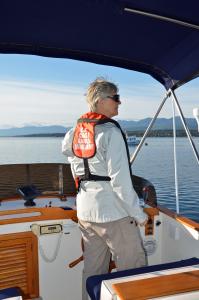Pamela Chelgren-Koterba

NOAA Heritage Oral History Project
NOAA Heritage Oral History Project aims to document the history and legacy of NOAA through compelling interviews with its leaders. These firsthand accounts provide an invaluable resource that preserves NOAA's significant contributions to environmental research and management, fostering a deeper understanding of NOAA's vital role in shaping our understanding of the Earth's oceans and atmosphere.
Molly Graham
Commander Pamela Chelgren-Koterba, born in 1950 in Annapolis, Maryland, grew up in various places across the United States. She was the third of seven children in the family of Captain John Chelgren, a distinguished U.S. Navy officer, and Ruth Henderson, a talented singer. Growing up, Pam played the piano and flute. She studied bioengineering at the University of California, Berkeley, and graduated in 1972. During her time at Berkeley, she worked at the Space Sciences Laboratory, contributing to the OGO 5 satellite data verification. In 1972, Pamela joined the NOAA Corps. After completing the NOAA Basic Officer Training Course in Kings Point, New York, she made history by becoming the first woman to receive an officer commission in the service's history. In October 1977, Pamela was appointed operations officer aboard the NOAAS Peirce, a 162-foot hydrographic survey ship, the highest shipboard posting ever held by a woman in any of the Uniformed Services of the United States. In May 1995, she retired with the rank of commander and transitioned into various roles in crisis readiness management and oil spill response. Outside of work, she and her husband, Frank Koterba, enjoy recreational skiing and boating
Scope and Content Note
Session 1: Commander Pamela Chelgren-Koterba reflects on her upbringing and interests before attending college at Berkeley. Her childhood was characterized by a focus on education and recreational activities such as camping, water skiing, snow skiing, and youth organization-sponsored events. At Berkeley, Pamela initially joined the math department but later switched to engineering after resolving administrative issues. She discusses the anti-war demonstrations on campus, experiences with her aunt who lived near by, the impact of the 1968 election, and the influence of college professors on Pamela's worldview during her formative years.
Session 2: Pamela Chelgren-Koterba talks more about her high school experiences, attending a program at Western Washington University, and her diverse interests in anthropology and computer programming. She traces her family's moves, which contributed to her sense of independence. The discussion then moves on to her college years, various jobs, and her decision to join the NOAA Corps. She highlights the influence of sailing in her decision and her experience as the first woman to join the Corps, sharing challenges and misconceptions she faced. Pamela shares stories from her early assignments with NOAA, particularly her work on the research vessel Oceanographer and the NOAA Ship Fairweather. She recounts surveying near a volcano and some memorable incidents during her time on the ships. Pamela describes her work onshore preparing Coast Pilot books, traveling to gather information for nautical charts. She shares humorous incidents and the excitement of traveling to different locations an her role as a Coast Pilot inspector, including diving experiences with NOAA doing hull inspections and locating wrecks in the Great Lakes.
Session 3: This session covers different periods, discussing Pam’s assignments with the Coast Pilot, experiences on different ships, and her work in response to oil spills. Pamela shares personal anecdotes, including her love for sailing, challenges faced as a married couple with a spouse constantly moving for work, a serious hiking accident and its impact on her life, and her experiences during the COVID-19 pandemic. She reflects on her career with NOAA, being the first woman in the Commissioned Corps, and the progress for women in NOAA. Throughout the interviews, Pamela emphasizes the importance of persistence and professionalism in her career and shares lessons learned from her boating experiences.
Please Note: The oral histories in this collection are protected by copyright and have been created for educational, research and personal use as described by the Fair Use Doctrine in the U.S. Copyright law. Please reach out Voices@noaa.gov to let us know how these interviews are being used in your research, project, exhibit, etc. The Voices staff can help provide other useful resources related to your inquiry.
The NOAA mission is to understand and predict changes in climate, weather, oceans, and coasts, to share that knowledge and information with others, and to conserve and manage coastal and marine ecosystems and resources. The Voices Oral History Archives offers public access to a wide range of accounts, including historical materials that are products of their particular times, and may contain offensive language or negative stereotypes.
Voices Oral History Archives does not verify the accuracy of materials submitted to us. The opinions expressed in the interviews are those of the interviewee only. The interviews here have been made available to the public only after the interviewer has confirmed that they have obtained consent.
